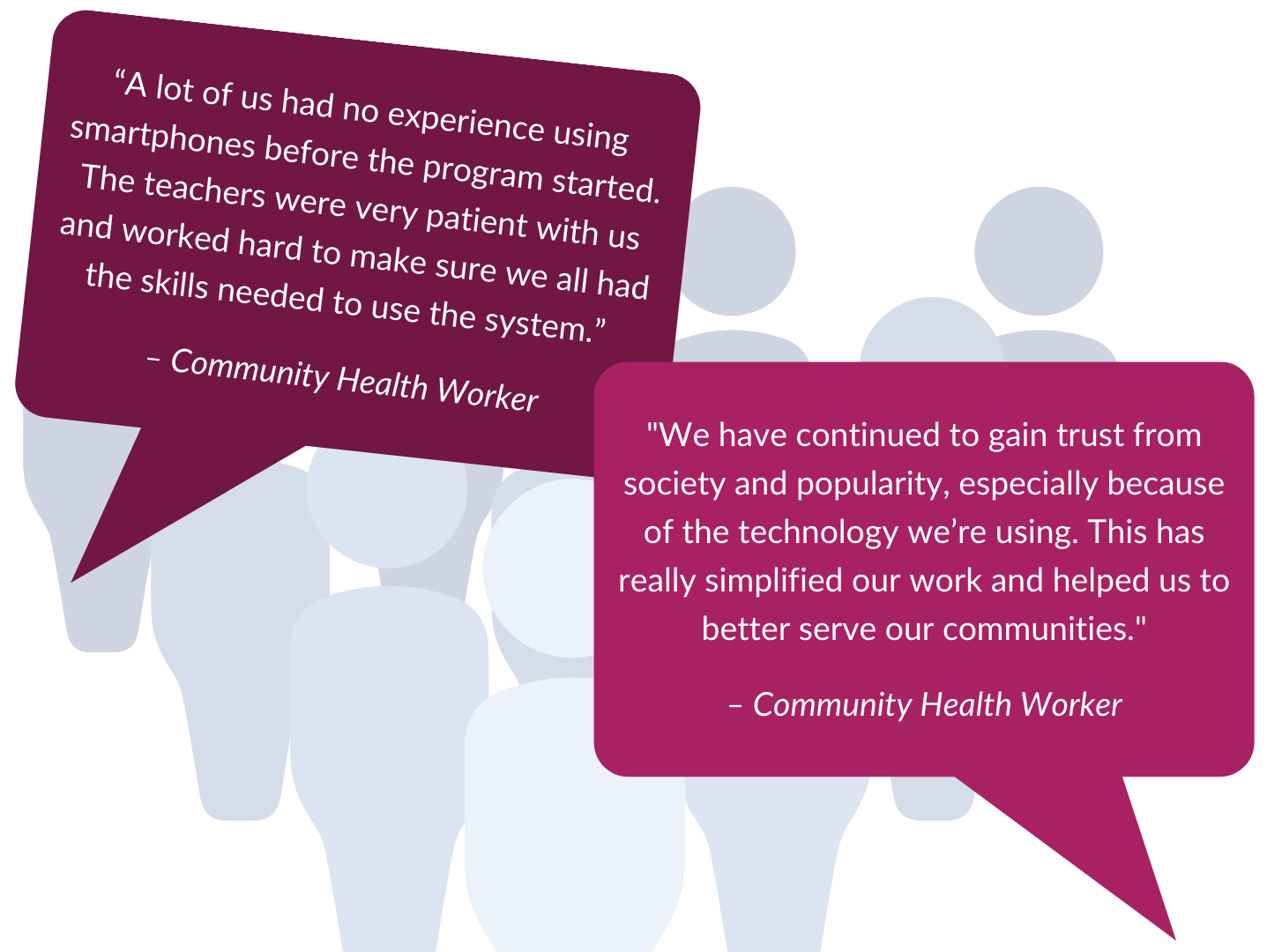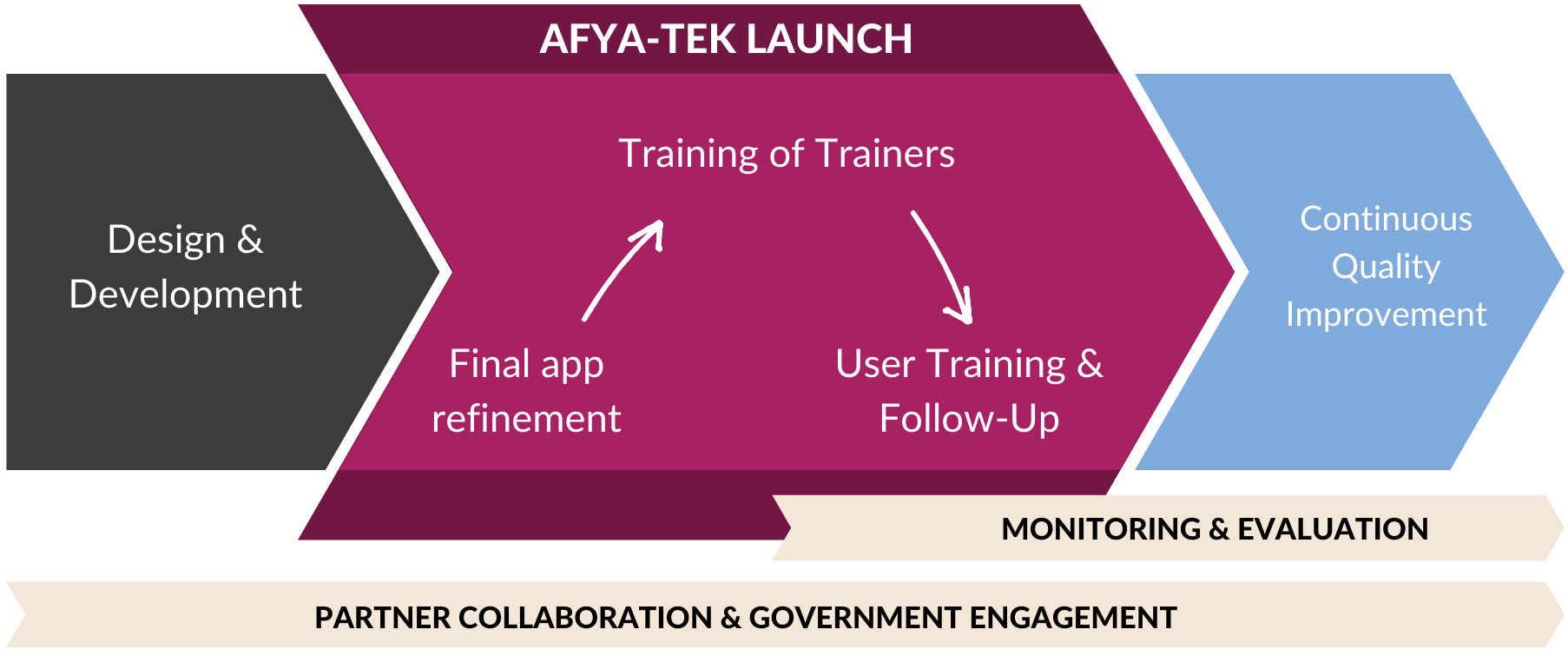In August 2020, D-tree and a consortium of partners launched the Afya-Tek digital system in Kibaha, Tanzania. Afya-Tek strengthens the primary healthcare system in Tanzania by linking community health workers (CHWs), health facilities, and private drug shops known as Accredited Drug Dispensing Outlets (ADDOs) through a first-of-its kind, fully digital system. With this linkage, Afya-Tek aims to improve care coordination, quality of treatment, and referrals for primary health services using cutting-edge technology. (A more detailed introduction to the Afya-Tek program can be found here).
Since the inception of the program in April 2019, D-tree’s multi-disciplinary team of public health professionals and technologists has worked closely with health and implementation partners, including Apotheker Consultancy Ltd., Simprints, Ona Systems, Inspired Ideas, and the Tanzanian government, including the Ministry of Health, Community Development, Gender, Elderly and Children (MOHCDGEC) and President’s Office Regional Administration and Local Government (PORALG), to design and develop the Afya-Tek system. The digital solution was built on OpenSRP—an open-source platform interoperable with existing government systems—and deploys cutting-edge technologies such as biometrics and artificial intelligence to establish a high-functioning referral ecosystem. After a thoughtful design period, we were then able to introduce the system in Kibaha from July to October of 2020 through a series of user trainings and subsequent follow-up visits.
When the uncertainties around COVID-19 delayed program rollout, the Afya-Tek team promptly revised the training plan, provided personal protective equipment for all staff and users, and aligned the training events with government COVID-19 guidance to safely enable the launch of this health systems strengthening program, even during the epidemic. We also worked with Apotheker (a Tanzanian public health consultancy firm and our primary implementation partner), and the Council and Regional Health Management Teams to integrate basic education on COVID-19 into the training so that CHWs could keep themselves safe and deliver key messages on prevention and detection to their communities
As Afya-Tek drove forward, we continued to work closely with Apotheker to ensure partner coordination and government alignment from the outset of the program launch. Following a comprehensive design period, the Afya-Tek team:
-
Trained 476 users (240 CHWs, 49 CHW supervisors, 45 health facility workers, and 142 ADDO dispensers) in Kibaha, Tanzania
-
Followed up with users and local health leaders after the trainings—as implementation began—to assess user performance, gauge community feedback, and address any issues
-
Monitored data from the field in real time through data dashboards to track the progress of end users as well as facilitate continuous quality improvement
Afya-Tek system users provided positive feedback on the training and utilizing the digital system, which we attribute to strong partner collaboration around developing and adjusting training plans; local stakeholder engagement and securing their buy-in to adopt and promote the system; highly skilled and prepared trainers who were comfortable with both the health and digital aspects of training; and enthusiastic participants who recognized the value of the system in making their jobs easier, which is the result of a thorough human-centered design process.
User training assessments and interviews, administered to evaluate user skills, revealed that the system was easy to use, with 99% of CHWs, 98% of HF staff, and 97% of ADDOs reporting they felt comfortable with the system. Even the 25% of users who did not have previous experience with technology reported feeling comfortable with the system by the end of training. Users were also trained on troubleshooting skills, and high-performing CHWs were identified and trained as “Champions” who will support their peers if challenges arise during implementation. These processes helped facilitate the smooth adoption of the system and established a sense of technical autonomy over the mobile device. Overall, users were eager to participate in the program and reported feeling more confident and conversant in using the system after training

Afya-Tek adopted a program framework that aims to promote continuous quality improvement throughout the program life cycle. We employed a robust human-centered design approach in designing and developing the system, which included conducting several workshops and feedback discussions with the end users, program beneficiaries, health providers, and government officials to develop an application that was user-friendly and aligned with users’ needs, interests, and existing workflows. We also embedded continuous system refinement processes into the development phase to incorporate feedback from the government, partners, users, and beneficiaries as we built the system.
After a successful and well-received training period, we began conducting ongoing follow-up visits and monitoring dashboards to evaluate user performance and provide immediate support to resolve challenges.

With training complete and follow up structures in place, we look forward to tracking and monitoring client visits and referrals among all three primary healthcare actors for this fully digitized referral system, documenting and evaluating health impacts, and implementing continuous quality improvement measures to optimize the system for scale, impact, and sustainability.

